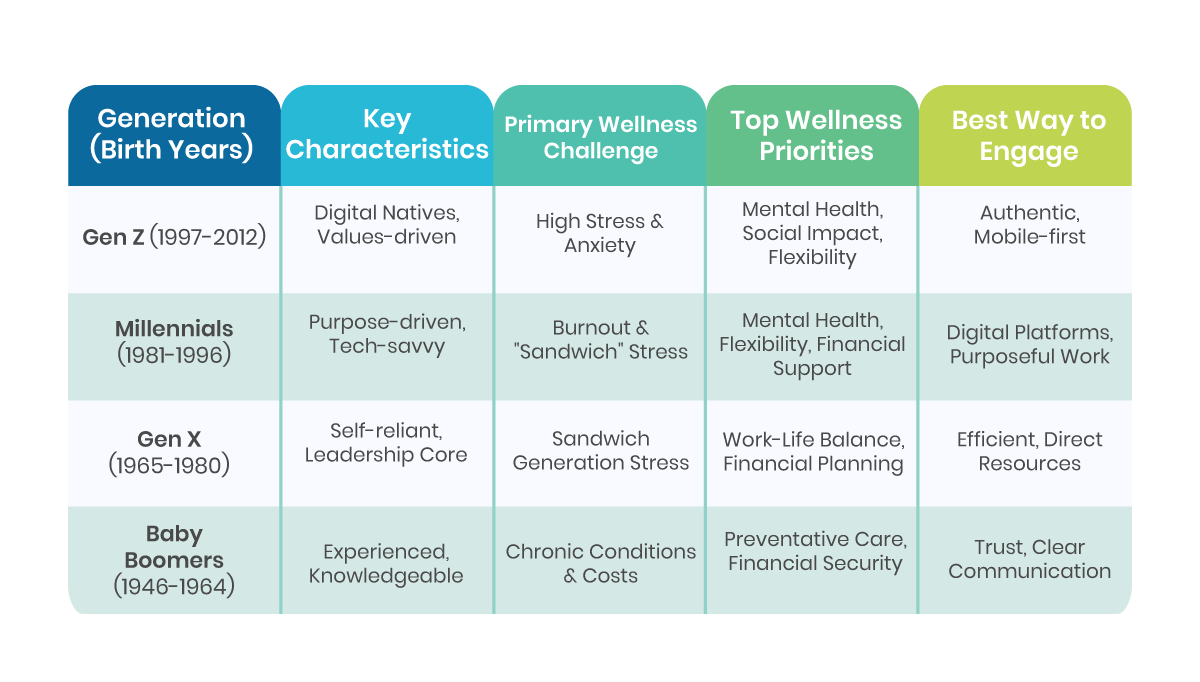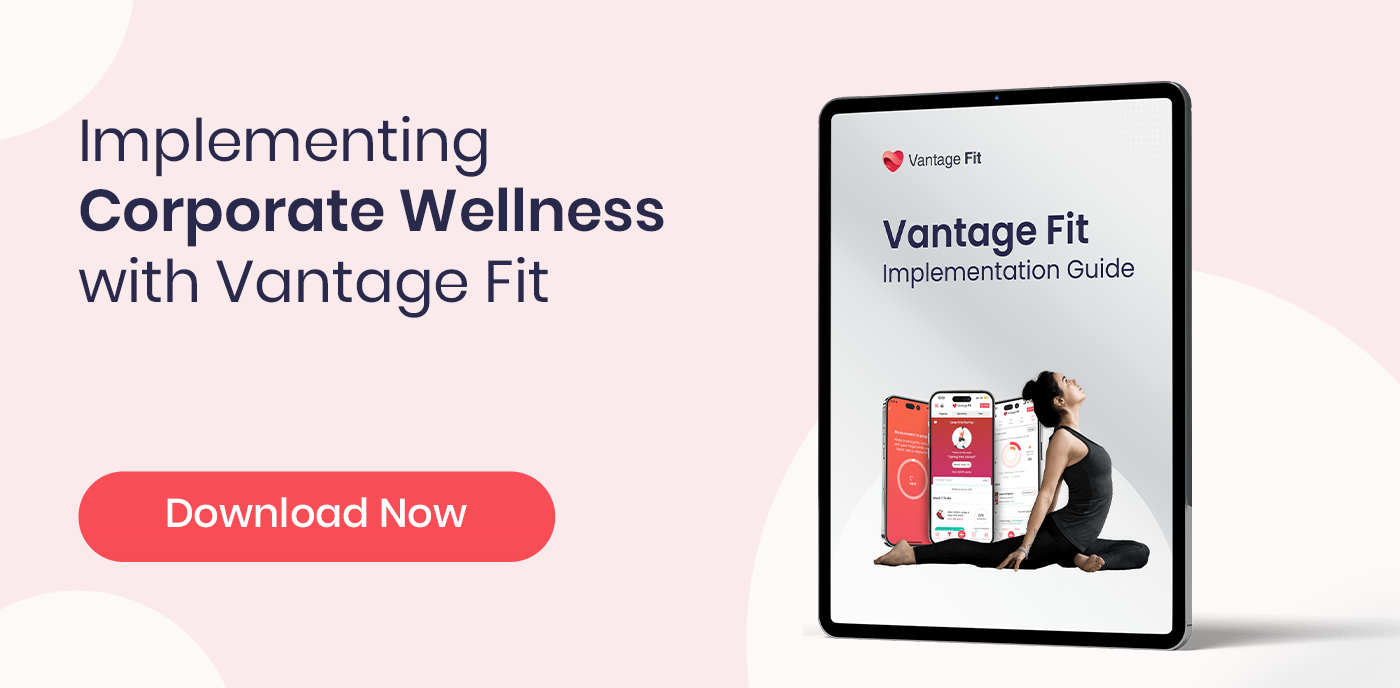Generational Wellness: Engaging Gen Z, Millennials, Gen X, and Boomers with Wellness Programs
Step into any modern office, and you'll find a vibrant mix of generations. A Gen Z employee might be scrolling through a mental health app. A Millennial, juggling work-life balance. A Gen Xer, navigating the pressures of both aging parents and growing kids. And a Baby Boomer, deep in conversation about retirement plans.
Each brings their quirks, values, and unique wellness needs. So, how can a single wellness program possibly support them all?
The answer is - It can’t. According to reports from firms like Paychex, we now have up to four distinct generations working side-by-side.
- Gen Z (1997-2012)
- Millennials (1981-1996)
- Generation X (1965-1980)
- Baby Boomers (1946-1964)
Expecting a single benefits plan to work for everyone is a flawed strategy. It's like buying a thousand pairs of the same shoe and hoping they'll fit the entire company.
That's where a more innovative approach comes in — Generational Wellness.
It's less of a complex theory and more about acknowledging the obvious. Different people, at various stages of their lives, need different things. As a recent 2024 Deloitte report on human sustainability highlights, creating a sense of belonging for all workers is directly linked to achieving better business outcomes.
Understanding these nuances is the key. It helps you build a wellness strategy that works. More importantly, it shows your people you see them for who they are, not just as a name on a payroll.
This framework is based on U.S. trends and research. Wellness needs and preferences may differ in other regions, so local context should be considered when applying these insights globally.
A Snapshot of Generational Wellness Needs

Gen Z: The Digital Natives with a Conscience

Let's start with your youngest and fastest-growing talent segment: Generation Z (born 1997-2012). According to Glassdoor, they have made 20% of the workforce in 2025.
Their primary wellness challenge is clear but concerning. They are the most stressed generation. A survey report from the Annie E. Casey Foundation revealed that Gen Z adults were the most likely to report their mental health was fair or poor. This anxiety is their baseline.
For me, a good wellness program isn’t about free snacks. It's about knowing I can have an honest conversation with my manager about feeling overwhelmed without fearing it will hurt my career. – A Gen Z Employee.
Here's what matters most to them:
- Mental Health as a Non-Negotiable: This is their top priority. They demand a culture that actively supports mental well-being with zero stigma.
- Social and Environmental Impact: For Gen Z, personal health is linked to planetary and social health. They need to see that their employer’s values align with their own.
- Radical Authenticity: This generation has a powerful radar for inauthenticity. Wellness efforts must be transparent, genuine, and co-created.
To engage them, you must be digital-first and deeply authentic. They prefer "snackable" content, such as short videos and gamified challenges, on their phones. More importantly, they need to feel that your program is a genuine, honest effort to support them, not just a formality.
Millennials (Gen Y): The New Leaders

Next are your Millennial employees (born 1981-1996). According to the Pew Research Center, they are the largest generation in the workforce. They are your current and future leaders.
Millennials' Broader Definition of Health and Wellness
Unlike previous generations, who often defined health as being "physically fit" or "free from illness," Millennials embrace a more holistic view.
Their top health indicators include not only physical fitness but also happiness and emotional well-being, demonstrating an expanded wellness mindset that encompasses mental health, stress relief, and life satisfaction.
The Wellness Paradox: Health Focus vs. Declining Well-being
Millennials are highly focused on health and well-being; however, studies reveal that their overall health is declining at a faster rate than that of previous generations. According to a study by Blue Cross Blue Shield Association, nearly one-third of millennials are affected by behavioral health conditions.
How Millennials Navigate Health Information Differently
A survey by Weber Shandwick and KRC Research revealed that millennials have the largest trust gap with their doctors among all generations.
Only about 50% of Millennials consider doctors to be the best source of health information. Instead, they rely heavily on digital health resources, such as WebMD and the Mayo Clinic. 55% report satisfaction with these platforms, often consulting Google before seeking clinical care.
38% percent of millennials trust their peers more than medical professionals. This reliance reflects a broader generational shift compared to Gen X and Baby Boomers, who tend to trust traditional healthcare providers more.
However, this wide access to information also creates anxiety and indecision. Many Millennials struggle with processing complex medical information. Only 23% feel that doctors communicate results clearly, and just 19% believe their doctors proactively manage their health, which contributes to frustration and uncertainty.
Wellness Priorities Reflecting Their Unique Challenges
-
Holistic Mental Health Support: Millennials were the first to bring mental health, burnout, and emotional well-being into open workplace dialogues. They value a culture that destigmatizes mental health days and seeks easy access to therapy, mindfulness tools, and digital mental health apps.
-
Real Financial Wellness: Financial stress, especially student loan debt, plays a significant role in their wellness. Programs offering student loan repayment assistance and confidential financial coaching are particularly valued.
-
Caregiver Stress Management: Older Millennials are now raising young children while also caring for aging Boomer parents. This phenomenon is often referred to as the 'sandwich generation.' Supporting these caregivers in managing stress is essential.
-
True Work-Life Flexibility: Flexible work arrangements are not just perks. They are essential stress management and burnout prevention tools for Millennials, underscoring their need for a healthy work-life balance.
Engaging Millennials Effectively: Practical Strategies
To successfully engage this group, wellness programs should incorporate:
-
Digital Access and Patient-Centric Tools: Millennials want control over their health journey. Providing telehealth services, wellness apps, and patient portals empowers millennials to manage their care alongside their healthcare providers, rather than being passive recipients of care.
-
Relatable, Partnership-Based Communication: Communications should acknowledge Millennials' prior research and invite collaboration rather than authoritarian advice. This approach builds trust and encourages proactive engagement.
-
On-site Group Classes and Learning Opportunities: Younger employees tend to exhibit higher participation in group fitness, nutrition, and sleep seminars. Inclusive programs offer social connections, enhance learning, and foster a comprehensive understanding of wellness.
-
Simplified System Navigation: Many Millennials are just beginning to advocate for themselves within the complex healthcare system. Clear, jargon-free information and navigation help them make confident and informed health decisions.
Gen X: The Self-Reliant "Sandwich" Generation and Health Activators

Often overlooked, Generation X (born 1965-1980) are the seasoned, self-reliant leaders holding the middle ground. They comprise a significant portion of the workforce and hold numerous leadership positions.
The Multi-Generational Health Activators
Known as the "Sandwich Generation," over 30% of Gen Xers balance caregiving responsibilities for aging parents while raising their children. This dual role makes them key decision-makers affecting Boomers and Generation Z alike, placing them at the center of multi-generational wellness.
You feel like you're running a marathon every single day. Between my daughter's college applications, my dad's doctor appointments, and my deadlines, my well-being often feels like the last thing on the list. – A Gen X Manager.
Education, Savviness, and Skepticism
Gen X is the most highly educated generation, with 35% holding college degrees. They also drive innovation; 55% of startup founders come from this generation. They are savvy healthcare consumers; studies show that two-thirds consider themselves "savvy" or "very savvy" when it comes to healthcare decisions.
Rooted in a healthy skepticism shaped by economic and social challenges over the years, Gen X demands clear and transparent communication, actively seeking to educate themselves.
Wellness Priorities Under Pressure
Balancing work, caregiving, and personal health, Gen Xers face significant financial and emotional stress. Their wellness priorities include:
-
Serious Stress Management: Practical, time-saving tools to manage overwhelming stress. Caregiver support, mental health resources, and building resilience are critical.
-
Financial Planning for the Future: At peak earning years but financially squeezed by college tuition and parental healthcare costs, Gen X values expert financial counseling.
-
Preventative Healthcare: Motivated by witnessing their parents' health struggles, Gen X actively pursues fitness, screenings, and preventive measures to avoid similar outcomes.
Engagement Strategies Tailored for Gen X
To effectively engage this pivotal generation, it's essential to:
-
Emphasize Strong Provider-Patient Relationships: Gen X thrives on consistent, reliable, and personalized communication with healthcare providers. Programs modeled on behavior-change theories that encourage ongoing contact help build trust and usage.
-
Offer Personalized, 1-on-1 Services: Busy and caring for multiple generations, they benefit from personalized wellness plans that also support their families.
-
Maintain a Consistent and Trusted Brand: Gen X shows higher brand loyalty compared to other generations. So delivering clear, educational seminars and campaigns with steady messaging fosters long-term engagement.
-
Provide Clear, Actionable Information: They are tech-savvy, but not tech-dependent. To engage them effectively, communication must be direct, respectful, and offer practical, transparent guidance on health and financial well-being.
-
Support Their Role as Family Health Gatekeepers: Gen Xers often manage healthcare decisions for both themselves and their families. Tailored support helps them step confidently into the role of Health Activators.
Gen X brings a unique mix of traits, multi-generational responsibilities, and clear preferences. By recognizing and reflecting these, businesses and healthcare providers can tap into an 'untapped gold mine' of health improvements. This would benefit not just individuals, but entire families and communities.
Baby Boomers: The Bedrock of Your Organization

Finally, let’s talk about the foundational pillar of many organizations: the Baby Boomers (born 1946-1964). They bring decades of institutional knowledge and experience. Many are working longer than ever before.
The Bain & Company projects that by 2030, workers aged 55 and older will comprise approximately a quarter of the workforce. Their focus has shifted from climbing the ladder to maintaining good health for a long career and an even better retirement.
Healthcare Behavior and Priorities
Baby Boomers place a strong trust in primary care clinicians and doctors. They prefer direct, face-to-face communication over online research for healthcare information.
The National Council on Aging reports that nearly 93% of adults 65 and older have at least one chronic condition, while nearly 79% have two or more.
Nearly 40% of Baby Boomers (ages 50-69) contact a doctor when they are symptomatic, compared to less than 25% of Millennials. They are less likely to seek non-clinical or broad definitions of healthcare and show limited interest in on-site mental health services (only 36% express openness), reflecting generational stigma or unfamiliarity.
Their wellness needs and priorities are pragmatic and focused on longevity:
-
Proactive Health Management: Preventive screenings, comprehensive support for chronic conditions, and easy access to trusted healthcare providers are top priorities.
-
Chronic Condition Management: Chronic illnesses are prevalent and often costly. Health programs should emphasize the full capabilities of clinics, including prescription dispensing and the management of chronic care.
-
Financial Security for the Future: Retirement preparation is a significant concern. Baby Boomers value straightforward financial guidance on healthcare costs and retirement savings.
-
Maintaining Physical Vitality: Staying active through low-impact activities like yoga, walking groups, and swimming helps preserve mobility and strength.
Communication and Engagement Preferences
-
Face-to-Face Interaction: Boomers strongly prefer in-person learning opportunities led by trusted clinicians and Wellness Coaches. Workshops and seminars build trust and confidence.
-
Traditional Communication Channels: Physical mail remains an important channel for Boomers alongside digital portals. Multichannel outreach ensures health information reaches them effectively.
-
Tangible Incentives: Unlike younger generations, who often desire digital or tech-based rewards, Baby Boomers favor concrete benefits, such as lower insurance premiums.
How to Engage Your Boomer Employees
To engage and support Baby Boomers effectively, consider the following approaches:
-
Build Trust Through Clear, Personal Communication: Prioritize consistent, face-to-face interactions with healthcare professionals and Wellness Coaches.
-
Highlight Chronic Care and Clinic Services: Communicate the comprehensive care options available beyond wellness programs, including the management of chronic conditions and access to prescription medications.
-
Offer Financial Counseling: Provide expert and confidential support for retirement planning and managing healthcare costs.
-
Encourage Physical Activity: Create accessible, low-impact exercise programs that support mobility.
-
Use Multichannel Communication: Combine mailed materials with digital portals and emails to ensure essential information is received.
-
Address Mental Health Sensitively: Increase awareness and reduce stigma through trusted communication and program design.
Baby Boomers remain a vital part of the workforce and contribute significantly to healthcare spending. They value trusted clinical relationships, tangible incentives, and traditional communication methods.
By recognizing these preferences, employers and healthcare providers can better engage boomers. This leads to improved health outcomes and workplace well-being.
The Benefits of Tailoring Wellness Programs for Each Generation
A tailored approach delivers measurable returns for your business.
-
Higher Employee Engagement: When you offer relevant solutions, people are more likely to participate. Engagement stops being a challenge and becomes a natural outcome.
-
Better Health Outcomes: Engaged employees tend to be healthier. This leads directly to fewer sick days and a reduction in overall healthcare claims and costs.
-
Increased Productivity: A less stressed, healthier workforce is more focused and effective. They can bring their best selves to work every day.
-
Improved Employee Retention: In a competitive talent market, feeling seen and supported is a massive driver of loyalty. A personalized wellness program is a powerful tool for employee retention.
Building a program this nuanced for every generation can feel like a huge task. That’s where we help. Vantage Fit provides a personalized, flexible wellness experience tailored to the unique needs of your multigenerational workforce.
From digital-first mental health support for Gen Z to robust preventative health measure tools for Boomers, we help you provide the right care to the right people at the right time.
Bottom Line
Embracing generational wellness not only supports individual well-being but also strengthens organizational resilience. This helps drive sustainable success in today’s ever-evolving business landscape.
Ready to empower your workforce with a tailored wellness program that truly delivers?
Discover how Vantage Fit can help you make it happen. Request a Demo today and take the first step toward a healthier, more engaged team.
Frequently Asked Questions (FAQs)
1. What is Generational Wellness?
Generational Wellness is the strategy of tailoring employee wellness programs to the specific health needs, values, and communication styles of each generation in the workforce.
2. What is a multigenerational wellness program?
It is a flexible wellness program offering a wide variety of support. For example, from retirement planning to mental health apps, to engaging all employees in a workplace with multiple generations effectively.
3. What are some of the most sought-after health incentives for Gen Z employees?
Effective wellness initiatives to attract Gen Zers focus on holistic, authentic support. Their most sought-after incentives are:
- On-demand mental health and therapy apps.
- Genuine work flexibility (remote or hybrid options).
- Wellness activities tied to a social or environmental cause.
- Access to personalized financial or career coaching.
4. How do I assess the wellness needs of different generations in my workforce?
- Quickly assess the needs of your workforce with these methods:
- Deploy anonymous employee wellness surveys.
- Conduct informal focus groups with different age demographics.
- Analyze your current benefits usage data to spot trends.
- Encourage managers to discuss well-being in one-on-one meetings.
5. How do different generations engage with wellness technology?
Engagement with wellness tech varies significantly by age:
-
Gen Z & Millennials: Digital-first; they prefer apps, wearables, and virtual coaching.
-
Gen X: Tech adapters; they use wellness portals and apps but also value virtual workshops.
-
Baby Boomers: Increasingly tech-adept; they use telehealth but often prefer a simple interface and the option for in-person care.
6. When will Generation Alpha join the workforce?
The next generation to watch is Generation Alpha (born 2013-2025). The oldest members of this group will start their careers in the early 2030s. Raised in a world of smart devices and rapid tech advancements, their arrival will likely accelerate demands for fully digital collaboration, greater work flexibility, and AI-integrated processes.
7. What common challenges arise when trying to implement a multigenerational wellness program?
Implementing multigenerational wellness programs can be challenging due to differing communication styles, technology comfort, wellness priorities, and motivational drivers across age groups. Success requires flexible, inclusive strategies and ongoing feedback to engage everyone effectively.







